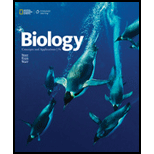
Concept explainers
Introduction:
An organism’s capacity to resist and combat against various foreign invaders (pathogens) like bacteria, virus and many others is known as the immunity of the body. The immunity of an individual is depicted by its immune system. The study of immunity is known as immunology.
Answer to Problem 1SQ
Correct answer:
An immune response is triggered by antigens. Hence, the correct answer is option d.
Explanation of Solution
Reason for correct answer:
Option d. is given as “antigens.”
An antigen represents the foreign particle which invades an individual’s body. It is responsible for the generation of the immune response by the immune system. The body clearly differentiates between self-cells and non-self (antigen) cells. So, when an invader enters the body, the immune response is generated and responds against the pathogen.
Reason for incorrect answer:
Option a. is given as, “cytokines.”
The cytokines are responsible for enhancing the ability of the immune system. These are produced by the white blood cells when the invasion of the pathogen is detected. Hence, option a. is incorrect.
Option b. is given as, “lysozyme.”
Lysozyme is found in tears, sweat, and saliva. It is a part of innate immunity and causes the lysis of non-self cells. Hence, option b. is incorrect.
Option c. is given as, “antibodies.”
The antibodies are specific in nature and are generated according to the invading antigen. These are produced from the activated B-cells of adaptive immunity. Hence, option c. is incorrect.
Option e. is given as, “histamines.”
When an invader enters the body of an individual, histamines are released from the white blood cells and mast cells. Histamines are responsible for the inflammatory responses at the injured part resulting in swollen and red condition due to excess secretion of interstitial fluid. Hence, option e. is incorrect.
Option f. is given as, “all of the above.”
An immune response is triggered only by antigens. Hence, option f. is incorrect.
Hence, the options a., b., c., e., and f. are incorrect.
The immune responses are generated against foreign antigens. Thus, the correct option is d.
Want to see more full solutions like this?
Chapter 34 Solutions
Biology: Concepts and Applications (MindTap Course List)
- 22. Which of the following mutant proteins is expected to have a dominant negative effect when over- expressed in normal cells? a. mutant PI3-kinase that lacks the SH2 domain but retains the kinase function b. mutant Grb2 protein that cannot bind to RTK c. mutant RTK that lacks the extracellular domain d. mutant PDK that has the PH domain but lost the kinase function e. all of the abovearrow_forwardWhat is the label ?arrow_forwardCan you described the image? Can you explain the question as well their answer and how to get to an answer to an problem like this?arrow_forward
- Describe the principle of homeostasis.arrow_forwardExplain how the hormones of the glands listed below travel around the body to target organs and tissues : Pituitary gland Hypothalamus Thyroid Parathyroid Adrenal Pineal Pancreas(islets of langerhans) Gonads (testes and ovaries) Placentaarrow_forwardWhat are the functions of the hormones produced in the glands listed below: Pituitary gland Hypothalamus Thyroid Parathyroid Adrenal Pineal Pancreas(islets of langerhans) Gonads (testes and ovaries) Placentaarrow_forward

 Medical Terminology for Health Professions, Spira...Health & NutritionISBN:9781305634350Author:Ann Ehrlich, Carol L. Schroeder, Laura Ehrlich, Katrina A. SchroederPublisher:Cengage Learning
Medical Terminology for Health Professions, Spira...Health & NutritionISBN:9781305634350Author:Ann Ehrlich, Carol L. Schroeder, Laura Ehrlich, Katrina A. SchroederPublisher:Cengage Learning Human Heredity: Principles and Issues (MindTap Co...BiologyISBN:9781305251052Author:Michael CummingsPublisher:Cengage Learning
Human Heredity: Principles and Issues (MindTap Co...BiologyISBN:9781305251052Author:Michael CummingsPublisher:Cengage Learning Concepts of BiologyBiologyISBN:9781938168116Author:Samantha Fowler, Rebecca Roush, James WisePublisher:OpenStax College
Concepts of BiologyBiologyISBN:9781938168116Author:Samantha Fowler, Rebecca Roush, James WisePublisher:OpenStax College





